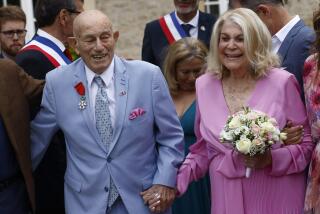Those Who Served Won’t Be Forgotten
- Share via
This Thursday it would be important, in addition to giving thanks for what we have, to take a moment to remember why we are even able to do so.
This came to mind as I returned from a visit to France last month. Few things are more special than coming back home to the freest land mankind has ever known--even if you have to pay a little duty on your purchases. But this time, after declaring the proper amount and after being asked by the customs agent if I had anything more of value, I confess now that my denial was false.
Tucked away in my suitcase in a simple plastic shopping bag was something--for me--of inestimable value. But it is inconceivable, in symbolic terms to Americans, that anyone could ever place a price tag on its contents.
It was while strolling on Normandy’s Calvados coast on a blustery day at a place called Omaha Beach that I looked down and recalled the words from the historian Stephen Ambrose’s extraordinary chronicle of D-Day: “The sand at Omaha Beach is golden in color, firm and fine, perfect for sunbathing and picnicking and digging. . . .”
Digging?
Impulsively, I knelt in the sand, scooped it up with my hand, and packed up this most priceless of any foreign acquisition to bring back to the soil of the nation where God had endowed millions of his finest sons with wits and courage, strength and determination, love of freedom and an endless sense of commitment. They had all this and more--rescuing a continent, saving a world, preserving the sweetness that is our liberty and making it possible for Thanksgiving days where families gather around abundant tables in warmth and good cheer--all very far removed from H-hour, June 6, 1944, on that unforgiving expanse of sand.
I keep this treasure of mine within sight because it dwarfs any of life’s obstacles. I think about how on that late spring day 55 years ago, it would be many weeks before those golden grains were fully cleansed of the red that colored them--a grotesque stain from a mixture of the remorseless surf and the life drained out of the men, so many of whom began that day as kids. Just plain kids.
As we walked through the American Cemetery at Normandy, there was this great contradiction--a contrast of this decades-old carnage replaced today by hushed quiet--a searing emotional pull combined with an eerie physical chill brought on by the enormity of what was.
At that hallowed place, one’s eyes rivet on the tableaux of Crosses and Stars of David laid out in perfect symmetry on a carpet of the greenest possible grass. It is the kind of lush field that must have been in the memory banks of those young men facing death--the memory of a time when they did not have to kill or be killed--a time when life meant hopes and dreams and not the specter of faceless men raining fury from the bluffs above on orders from a vile dictator.
There inevitably comes a point at this beautiful memorial where visitors find themselves gulping, choking and helplessly giving in to the overwhelming power of it all.
Ronald Reagan once phrased it in his inimitable way: “Where did we find such men? We found them where we always found them--in our villages and towns, on our city streets, in our shops, and on our farms. Just the best damn fighting men the world ever produced.” Men like my father-in-law, Cpl. Oscar Ford, a 24-year-old infantry foot soldier who fought through fierce enemy defenses for Patton’s advance into Germany and returned home. Men like my cousin, Luther Avakian, whose life ended the day after D-Day in his beloved P-47 in the skies over France. He was 21.
At one end of the Normandy cemetery is a simple chapel dominated by an altar of black and gold Pyrenees Grand Antique marble with this inscription etched in it and etched into my recollection of that day: “I give unto them eternal life and they shall never perish.”
And I found myself thinking of the reverse: They perished and gave back life--to you and me and a country that asked so much of them.
Give thanks that they answered.


